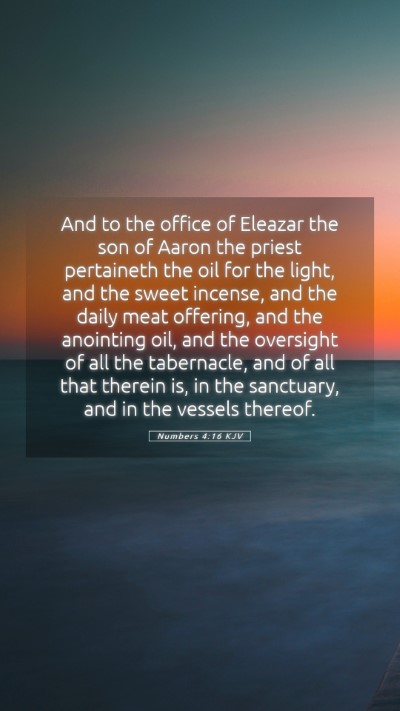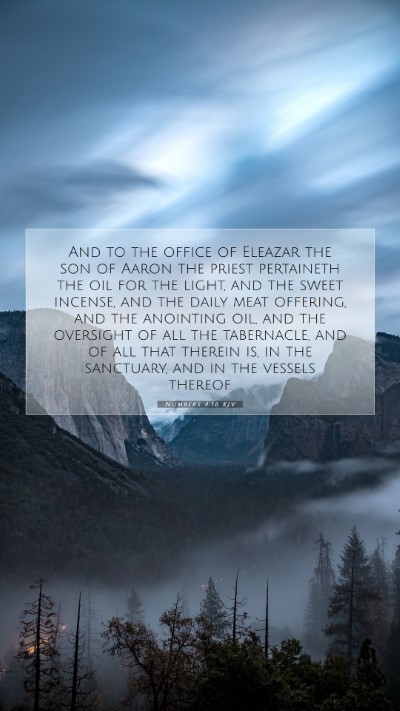Understanding Numbers 4:16
This section of Scripture provides significant insights into the responsibilities and roles assigned to the Levitical priests and their service in the Tabernacle. Numbers 4:16 reads:
"And to the office of Eleazar, the son of Aaron the priest, pertaineth the oil for the light, and the sweet incense, and the daily meat offering, and the anointing oil: the oversight of all the tabernacle, and of all that therein is, in the sanctuary, and in the vessels thereof."
Bible Verse Meanings
The verse highlights the specific duties assigned to Eleazar, the son of Aaron, indicating a structured system of worship and service. The mention of oil for the light emphasizes the need for illumination in the Holy Place, symbolizing the spiritual enlightenment needed in the lives of God's people.
Bible Verse Interpretations
- Significance of the Oil: The oil represents the Holy Spirit’s presence and guidance, essential for the functioning of the sacred space.
- Daily Offerings: The mention of sweet incense and daily meat offerings reflects the importance of continuous worship and the sustaining relationship between God and His people.
- Oversight Role: Eleazar’s role involves overseeing all aspects of the tabernacle’s sanctity, which teaches us about the necessity of stewardship in spiritual matters.
Bible Verse Understanding
Understanding this verse requires recognizing the historical context of the Israelite worship system. Eleazar’s responsibilities signify the continuity of divine order established for worship among the Israelites.
Bible Verse Explanations
The duties outlined in Numbers 4:16 are not merely ceremonial; they reflect profound spiritual principles that can be applied to our lives today. The idea of maintaining the light and the offerings symbolizes our responsibility to tend to our spiritual lives and the lives of others.
Bible Verse Commentary
According to Matthew Henry's Commentary, these regulations ensured that the tabernacle's service was carried out with holiness and precision. Every element had its purpose, fostering a profound respect for God’s presence among the community.
Albert Barnes elaborates on the importance of Eleazar's role, emphasizing that these duties were not just functional but integral to the spiritual wellbeing of the Israelite nation, indicating that oversight in spiritual matters is a shared responsibility.
Adam Clarke comments that the various offerings prescribed were intended to reinforce the people’s relationship with God, serving as a reminder of their covenant and ongoing commitments to Him.
Related Biblical Cross References
- Exodus 27:20-21: Discusses the oil for the lamp, tying in with the theme of divine illumination.
- Leviticus 24:2: Pertains to the command to keep the lamps burning continually, reinforcing the need for constant spiritual vigilance.
- Hebrews 9:6-7: Explains the continual offerings and the roles of priests within the New Covenant context.
Conclusion
In summary, Numbers 4:16 offers rich Bible study insights into the structured system of worship in ancient Israel, the significance of spiritual oversight, and our constant need for divine illumination and sustenance through our relationship with God. This verse serves as a reminder of the importance of our roles in supporting a vibrant and holy worship experience within our communities today.
If you are looking to deepen your Bible verse understandings, consider engaging in Bible study groups or utilizing Bible study tools for further exploration of this and other passages. Resources such as Bible study guides and online Bible study courses can greatly enhance your learning experience.


